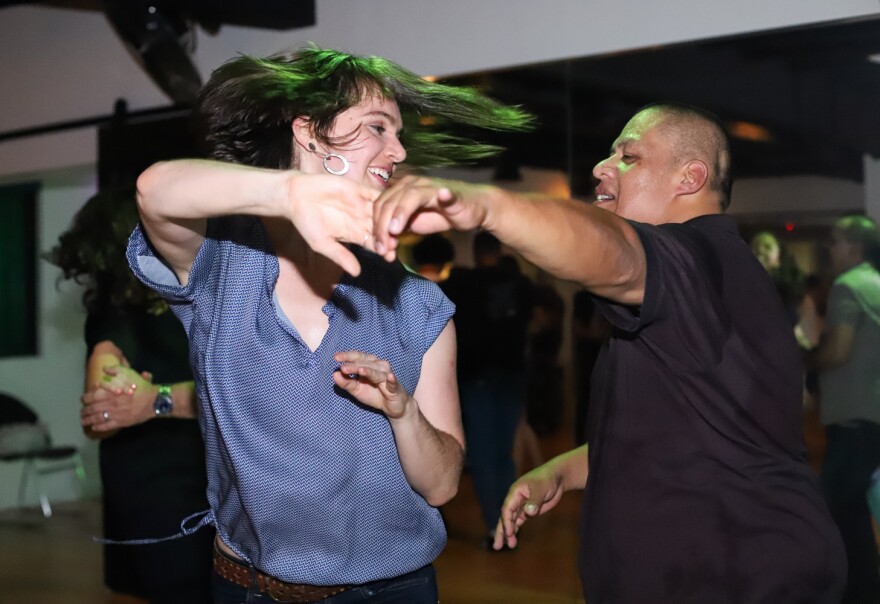Carmen Guynn has been dancing to Latin music for more than 20 years, and in recent years, she's had a lot more company on the dance floor.
But even though the number of St. Louisans dancing to the music of Latin America is growing, Guynn often finds herself explaining and teaching the different styles of music she focuses on — salsa, merengue and bachata of the Spanish-speaking Caribbean. Sometimes she compares the music to North American styles.
“Bachata is a dance from the Dominican Republic,” Guynn said. “When people ask me, it’s almost like the blues. It’s kind of sad and lonely, so bachata kind of tells that story.”
For a decade, Guynn has shared her knowledge of Latin music and dance with dancers at the annual St. Louis International Salsa Bachata Congress. This weekend, the city will again host hundreds of visitors eager to attend workshops and refine their dance steps.
For Guynn, who is organizing the event, the gathering is another sign that the city’s Latin dance scene has come a long way since the late 1990s, when she was among a small group of dancers. Back then, she had to go to other cities to attend large dance events.
“The very first [congress] that I attended was in Chicago,” Guynn said. “I was in my mid-20s at the time, and I'm like, ‘I want to do something like this in St. Louis, and I think it's needed.’ And I didn't do it until almost 10 years later.”
This year’s salsa congress has made St. Louis a must-stop for Juliana Paiva and Hugo Trejo of Kansas City. The two took to the dance floor of Convergence Dance and Body Center on Manchester Road on Saturday to give dancers a taste of their bachata performance this weekend.
Paiva enjoys the fluid dance because it requires partners to really focus on the rhythm of the music.
“It’s one of my happiest moments, honestly,” Paiva said as she came off the dance floor. “It kind of feels like my emotions can just flow with the song.”
People come to the salsa congress from as far away as Puerto Rico, the Dominican Republic and Italy. Guynn expects about 300 people to attend this year.
Her love for Latin dance also inspired her to start to start a dance company, Almas Del Ritmo Dance Company, to perform and teach.
She said the success of the event owes much to the growing number of students and dancers, but also to all of the work she and others have put in.

“I really had to do a lot of explaining, nor did I have pictures or anything to show that what this was about,” Guynn said. “Even now looking back 10 years later, you've seen it open up to the city, and it technically took this amount of time for St. Louis to really kind of like, ‘Oh, this culture exists.’”
Latin dance has grown in popularity in St. Louis since the late 1990s, when Latino immigrants and others began forming a community. In 1996, Club Viva, which focuses on international music, opened in the Central West End.
But building interest in those early days was difficult, said Cesar Cardona, the club’s current owner.
“I had an idea,” Cardona recalled. “I know people in L.A. maybe were going to start bringing some people from Los Angeles to teach us. 'We can call him, maybe he can bring him for the weekend, do some workshops, because I know how to dance, but I cannot teach.'”
Cardona, who moved to the U.S. from Colombia in 1986, wants the dancers who come to his club to leave with an appreciation for where the music came from.
“Salsa” is used to describe a variety of Latin rhythms that emerged from Afro-Cuban music. In the U.S., the music has particularly had fans since 1940s and 1950s, when Cuban and Puerto Rican musicians helped fuel the mambo craze in New York City.

In the 1970s, the famed Fania Records music label remade the music with its fusion of Latin American rhythms and the urban vibe of New York City streets.
Musicians from other countries, including Colombia, Panama and the Dominican Republic, also help keep the music alive — and fresh.
“Many countries try to say salsa came from here, from there, but salsa is a mix of many rhythms,” Cardona said. “The origin of salsa comes from when they brought the slaves from Africa, they brought their percussion and all the Carribbean. But the Spaniard brought all the chord music, the guitar and all the instruments.”
Guynn talks a lot about that history. But this weekend, she hopes people at the congress also get a sense of how the city has embraced the music and those who grew up listening to it.
“Latin culture is alive and well in St. Louis,” she said, “not only through dance, but through food, through art.”
Guynn hopes people who attend the event will keep growing as dancers and try dances they’ve never done before. She said the event also fosters a sense of community.
That’s what keeps dancers like Trejo coming back.
“When you’re around dancers, especially for the St. Louis Salsa Congress, it’s such a great feeling,” Trejo said. “That’s the reason why everybody goes, because you’re around your own people. It’s like family because we’re all dancers; we all have it inside.”
Follow Chad on Twitter @iamcdavis
Send questions and comments about this story to feedback@stlpublicradio.org




